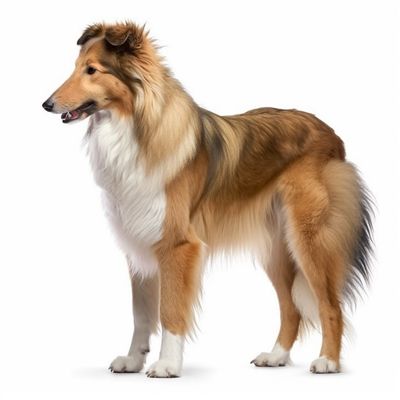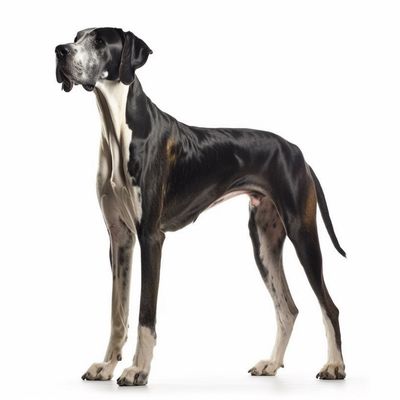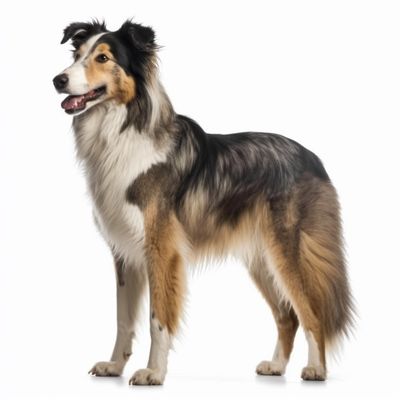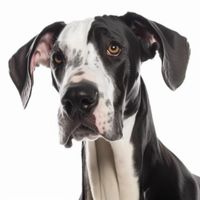Rough Collie - vs - Great Dane - vs - Border Collie

Rough Collies are large-sized dogs, weighing 53-60 lbs, with a height of 22-24 inches.
Rough Collies have a medium energy level, enjoying daily walks and playtime, but are also content with downtime.
Rough Collies need regular exercise, including daily walks and playtime, to keep them happy and healthy.
Rough Collies are intelligent and eager to please, making them easy to train with consistent, positive reinforcement.
Rough Collies are highly intelligent dogs, capable of learning a variety of commands and tasks quickly.
Rough Collies can adapt to different living situations, but they require enough space to move comfortably and regular grooming.
Rough Collies are gentle and patient, making them good with children when properly supervised.
Rough Collies can get along well with other pets, especially when raised together. Early socialization is important.
Rough Collies can tolerate colder temperatures, thanks to their double coat, which provides insulation.
Rough Collies can tolerate hot climates, but they need to be monitored for signs of overheating due to their thick coat.
Rough Collies have a double coat and shed heavily, requiring regular brushing to manage shedding and prevent matting.
Rough Collies require regular grooming, including frequent brushing and occasional bathing to keep their coats clean and healthy.
Rough Collies are generally healthy, but regular veterinary checkups and preventative care are still necessary.

Great Danes are giant-sized dogs, weighing 110-175 lbs, with a height of 28-32 inches.
Great Danes have a medium energy level, enjoying daily walks and playtime but also appreciating relaxation time.
Great Danes need regular exercise, including daily walks and playtime, but should not be overexerted due to their size.
Great Danes are intelligent and trainable, but can be stubborn at times. Consistent, positive reinforcement is key.
Great Danes are intelligent dogs, capable of learning a variety of commands and tasks.
Great Danes can adapt to different living situations, but their size requires enough space to move comfortably.
Great Danes can be good with children due to their gentle nature, but their size requires supervision and proper handling.
Great Danes can get along well with other pets, especially when raised together. However, early socialization is important.
Great Danes can tolerate colder temperatures, but their short coats require proper protection during extreme cold.
Great Danes can tolerate hot climates, but they need to be monitored for signs of overheating during exercise.
Great Danes have a short coat and shed moderately, requiring regular brushing to manage shedding.
Great Danes require minimal grooming, including occasional brushing and bathing to keep their coats clean and healthy.
Great Danes bark occasionally, usually only when necessary or provoked.
Great Danes may have some health issues, requiring regular veterinary checkups and preventative care.

Border Collies are medium-sized dogs, weighing 30-45 lbs, with a height of 18-22 inches.
Border Collies have a high energy level, requiring plenty of physical and mental stimulation.
Border Collies need extensive exercise, including daily walks, runs, and mental challenges like training or dog sports.
Border Collies are highly intelligent and trainable, excelling in obedience and various dog sports.
Border Collies are considered one of the most intelligent dog breeds and can learn a wide range of commands and tasks.
Border Collies can adapt to different living situations, but they thrive in environments with plenty of space to run and exercise.
Border Collies can be good with children, but their herding instincts may cause them to nip or chase. Proper supervision and training are essential.
Border Collies can get along with other pets, but early socialization and proper training are important to manage their herding instincts.
Border Collies can tolerate colder temperatures thanks to their double coat, but proper protection is necessary during extreme cold.
Border Collies can tolerate hot climates but need to be monitored for signs of overheating during exercise.
Border Collies have a double coat that sheds seasonally, requiring regular brushing to manage shedding.
Border Collies require regular grooming, including brushing, bathing, and trimming to keep their coats clean and healthy.
Border Collies have average bark tendencies and may bark for various reasons, such as alerting their owners or during playtime.
Border Collies may experience some health issues and require additional care and attention, such as regular veterinary checkups, preventative care, and potential medication or treatments.



